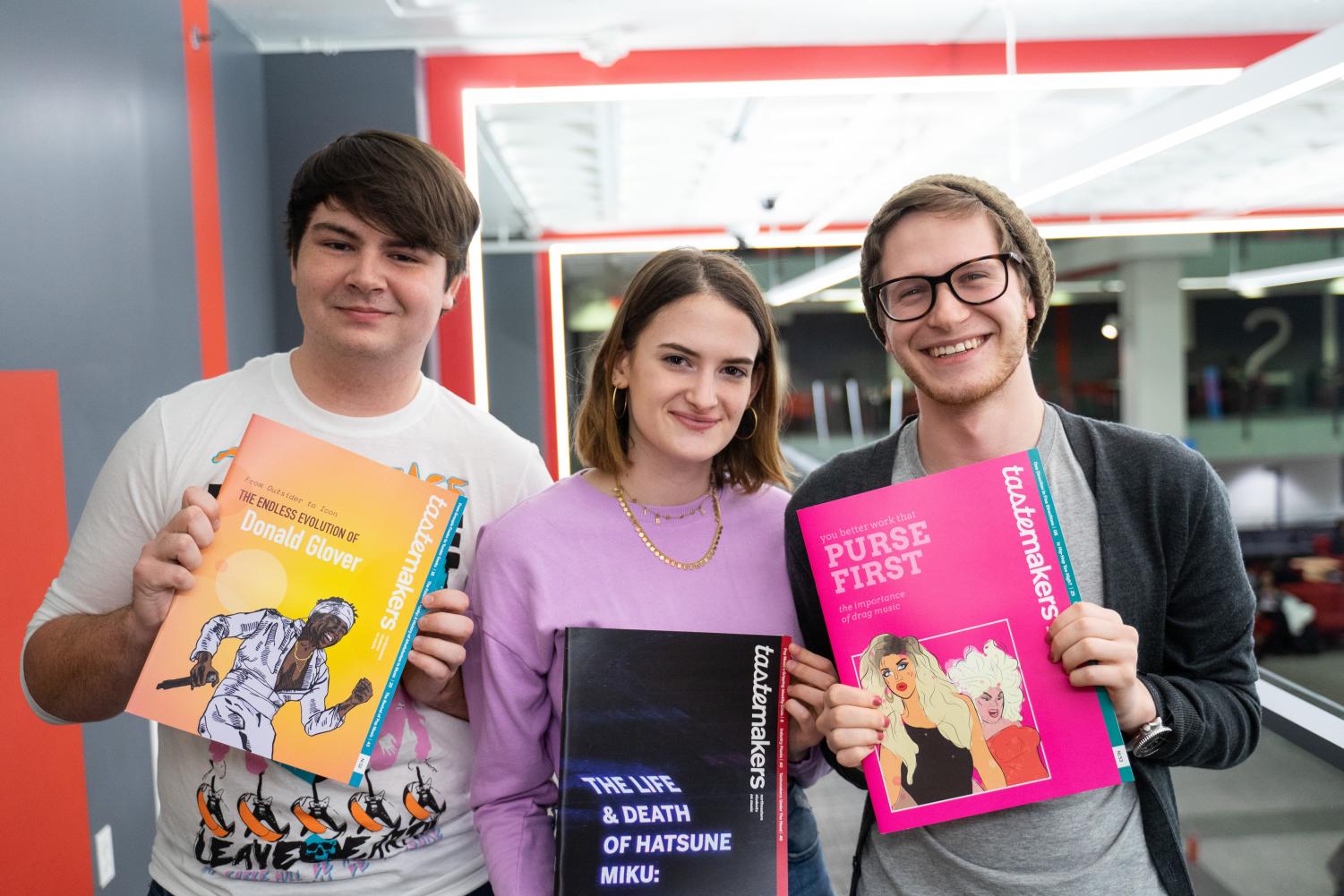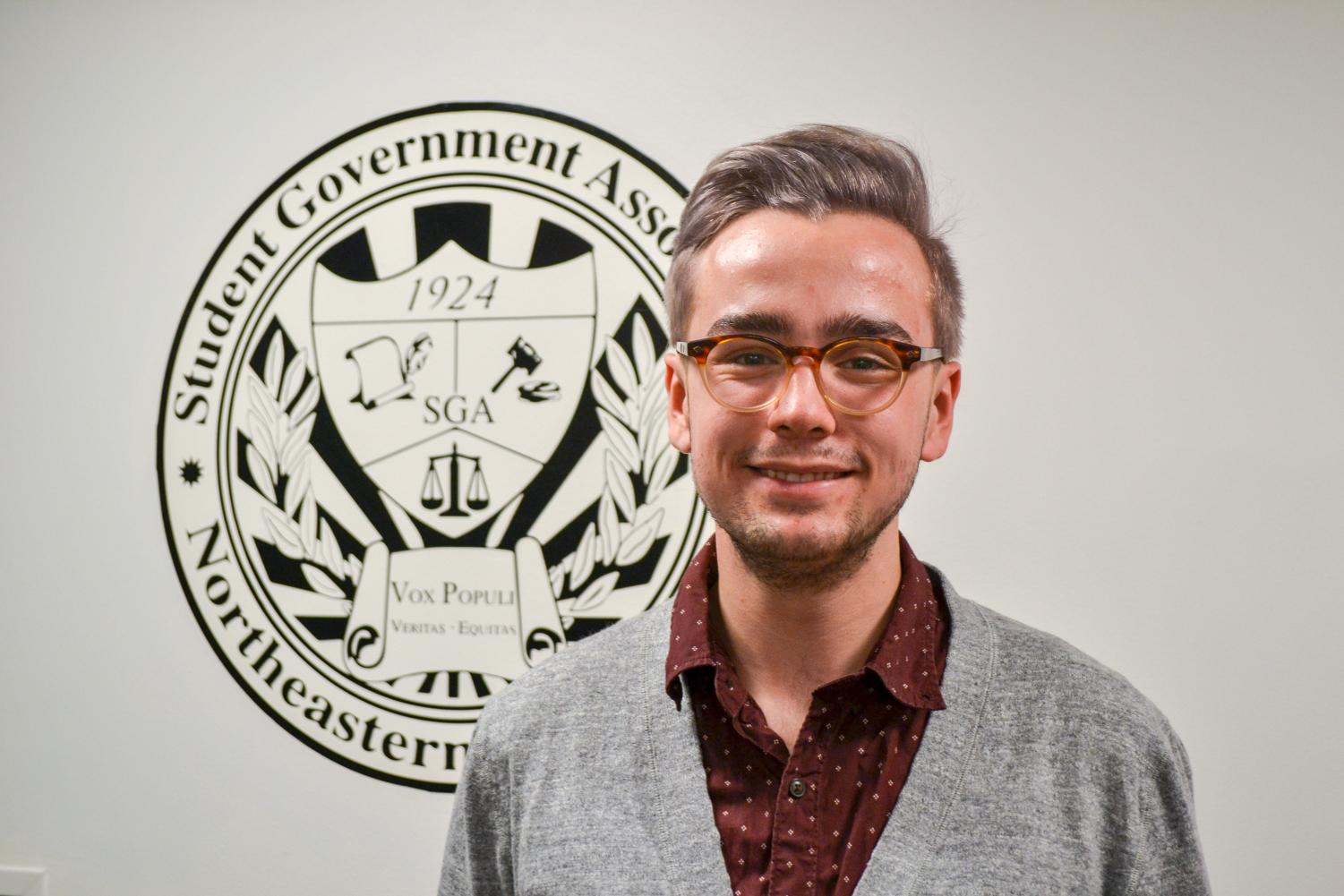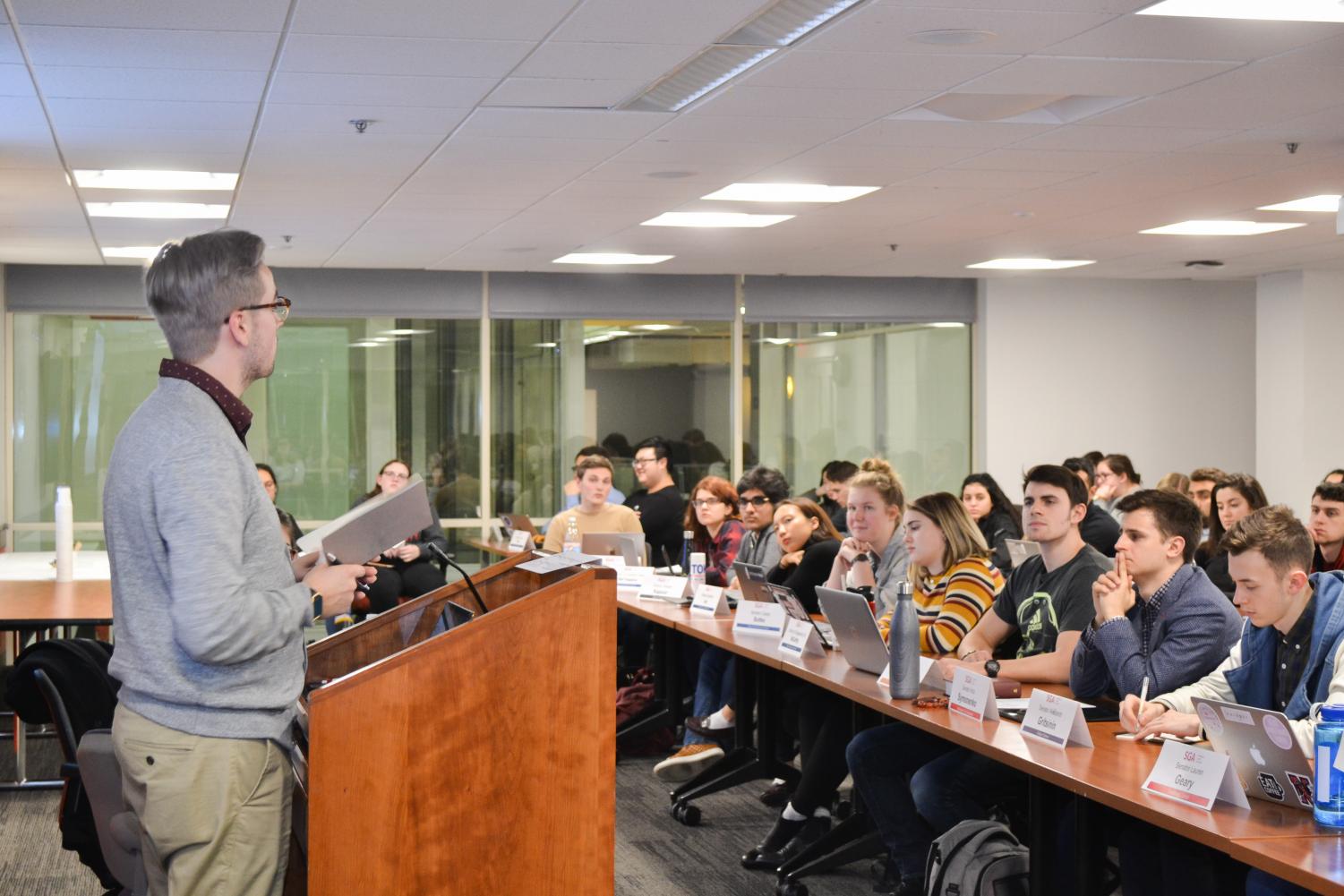SGA widely cuts club funding but maintains near-$57,000 budget
February 7, 2019
Student club budgets were cut across the board this November, some by as much as 40 percent, after the Student Government Association discovered that an increase in funding requests threatened to max out the pool of money created by the Student Activity Fee, or SAF.
Many clubs are now struggling to operate and have been forced to cancel plans and cut programs for the spring semester.
At the same time, SGA’s own budget was approved for all $56,991 it requested, including $2,250 stipends for nine SGA officials.
“We’ve just had this hard fluctuation between the number of clubs and how active they are,” said SGA President Dylan Balcom. “In recent years, the number of clubs on campus has just been skyrocketing … As we have more groups, and as groups become more active, we have less in the SAF pot to distribute.”
NUTV, for example, had to change plans for its popular film festival Campus Movie Fest. Though NUTV’s annual budget wasn’t decreased, the club was denied the $15,000 they normally receive for the event, which they’ve hosted on campus for 10 years. Advika Grover, an NUTV marketing director, said they should still be able to host the event with minor changes thanks to a compromise with the Movie Fest national association.
“This year they told us they could not give us any money at all for the event,” NUTV Vice President Brigitte Gong said. “Campus Movie Fest is special because it’s open to everyone at Northeastern, it’s the nation’s largest student film festival, and [losing] it would be a huge blow to the creative community.”
Every NU undergraduate student pays a $136 activity fee. This creates a pool of more than $2 million, according to the SGA Finance Board website. The board, whose voting members are all students, is tasked with distributing these funds to NU’s many student organizations. Recently, this was complicated by an increased volume of requests.
There are more than 500 clubs listed on the Center for Student Involvement website, and around 175 groups requested money this year, SGA Comptroller Max Willner-Giwerc said, though he said the breakdown of where the funds go is confidential.
Willner-Giwerc guides the Finance Board through deciding how to distribute funds generated by the SAF. Clubs make presentations to the Finance Board, making their case for why they should get a chunk of the activity fee. But neither he nor the board has access to a detailed breakdown — he said the university requires that to be confidential due to “privacy concerns.”
The activity fee increases only with inflation, not with the rise in funding requests. Willner-Giwerc and Balcom said the rise in funding requests created a budgetary conflict, and the student activity fund could not keep up with what those clubs hoped to achieve. Willner-Giwerc called this “growing pains.”
The board discovered if they didn’t cut club budgets significantly, there would be a deficit. But Willner-Giwerc and his team realized this in November, shortly before students were due to present their budget requests. At least two groups presented Nov. 14 after receiving an email the day before saying there would be budget decreases across campus.
“We calculated a worst-case scenario of having to cut 40 percent from every club’s budget,” said Willner-Giwerc, a second-year politics, philosophy and economics major.
Clubs hit hard by cuts
The News spoke to 12 clubs for this story; almost all of them reported operational problems caused by the budgeting allotments.
Student science magazine NU Sci was hit hard by the cuts. Sage Wesenberg, the magazine’s editor-in-chief, said SGA cut their normal funding by 40 percent.
In the past, the club received enough money to print two magazines per semester, subscribe to a stock photo service and self-promote. This semester, they could only afford printing — and even then, they had to decrease their print circulation from 1,000 copies to between 500 and 750.
Wesenberg and club President Jackson Griffiths presented the group’s budget to the finance board in November. After they had already finished final preparations, they received the surprising email less than 24 hours before their presentation.
“The issue I had was, one, the notice,” said Griffiths, a fourth-year cell and molecular biology major. “We had been preparing for it for a long time and we found out [one day] before.”
This instant change of plans left the club leaders unsure of how to proceed into their presentations.
“We kept waiting for them to say something. I was surprised they let us speak for as long as we did,” said Wesenberg, a fifth-year biology major. “At the end, Max [Willner-Giwerc] said ‘So we have good news and bad news. The bad news is that your budget is going to be cut by 40 percent.’ To us, it wouldn’t have mattered if we presented at all.”
Willner-Giwerc declined to comment on this particular scenario but said that the board does not “make decisions going into a meeting,” rather they do research beforehand to prepare.
Tastemakers music magazine is another campus publication that finds itself in dire financial straits after November’s budget allocations.

Tastemakers e-board members Grant Foskett, Hannah Crotty and Jason Levy pose with their music magazine.
Tastemakers submits four requests each year, which is the maximum for organizations that don’t qualify for an annual budget. (Only clubs that demonstrate they cannot operate on an event-to-event basis qualify for annual budgets.)
Tastemakers requests money for one concert and one print magazine per semester. But in the latest round, SGA cut the magazine’s concert fund by 40 percent and the print budget by 30 percent. Tastemakers President Justine Cowan declined to provide the specific amounts.
Cowan didn’t know if she should stick to her original plan for the request or scale it down in light of the last-minute email.
“I debated if I wanted to acknowledge [the cuts] going in,” Cowan said. “I ultimately decided against it because I still wanted to argue my case for why I was requesting more money for the show. Ultimately it was because I believed a slight increase in funding would provide us a little more flexibility when negotiating with booking agents for artists we thought would have a much better draw for the Northeastern community.”
Cowan said the cuts mean they’ll order 500 copies of their next magazine instead of the typical 1,000. After that, they may be forced to go down to 300.
Julia Thompson, the president of the NU Student Nurses Association, or NUSNA, planned to request funding for the club for the first time. After November’s news, she no longer felt that was viable.
“Our biggest expense is going to the national SNA convention,” Thompson said. “It’s a great experience for our members, but it’s very expensive. We were hoping to look into using the SAF to help cover registration costs.”
NU Stage President Sam Boggiano said the decreases are coming at a time of unexpected increased costs for the theatre club — they were recently required to provide increased security funds for its events.
“We’re talking about ways to decrease next year’s budget,” Boggiano said. “We’ve preemptively raised our dues from $15 to $20 because the security costs will definitely exceed our budget increase so we already know we will have problems.”
The decrease could alter the club’s productions noticeably, Boggiano said.
“We’ve started to talk about decreasing show budgets,” he said. “And that’s really unfortunate because we like to give our designers and our tech people the ability and resources to be creative and make some really great things.”
Parker Brown, the president of WRBB, said the radio station is cutting back on marketing, technical equipment and catered events for its 200-plus members.
NUTV actually received a budget increase this year, said Vice President Gong, though the Finance Board did not share the reason with them per their non-disclosure policy. Gong said she would have rather maintained the same budget if it meant having money for Movie Fest.
“Campus MovieFest is special because it’s open to everyone at Northeastern,” Gong said. “I think if we had been told beforehand … we could’ve found a way around it.”
Solutions fall short
Cowan, Griffiths and Wesenberg said the Finance Board offered them guidance on how to raise additional funds. But they were skeptical that the suggestions were practical.
Willner-Giwerc said suggestions included Husky Starter, a channel that groups can use to ask alumni for donations, grants from academic colleges and “outside endorsements,” though those are only available to competition groups.
“Fundraising is difficult for a club like ours,” Griffiths said. “It’s obviously fun to be a member of NU Sci, and it’s rewarding to be printed, but it’s also a lot of work. And then to come back and say, ‘Can you pay for it too? Can you donate so we can run?’ is kind of a big thing to ask of our members.”
Wesenberg said the fundraising ideas were often more geared toward groups trying to fund one big event near the end of the year, not an ongoing publication. Cowan said the methods weren’t scalable enough.
“Selling Krispy Kremes at Curry Crossroads or selling coffee, it gives you a little money but not anything substantial,” Cowan said, adding that she found it hard to fundraise during her time as president of a marketing club on campus.
Willner-Giwerc was optimistic that groups could make ends meet. He said some groups cut their own budgets or operated effectively within the reduced bounds, though he wouldn’t provide specific examples.
“They were creative and came up with new ideas,” Willner-Giwerc said. “The austerity of the budget will always be met by the creativity of our groups.” However, he did admit that “the system is a little bent right now,” and a new one is in the works.
An opaque process
Cowan, the Tastemakers president, also said she was not provided with specific reasons why the finance board came to its decision.
“When I found out what they granted us, they essentially just said it was the blanket cut and there weren’t reasons specific to our organization,” Cowan said. “I haven’t received any specific reasons.”
Neither the Student Activities Business Office nor the Center for Student Involvement responded to requests for comment on who has access to the full distribution of the activity fee.
Willner-Giwerc said the reality is that nobody on the finance board can see a detailed breakdown of how student activity funds are allocated, not even the comptroller himself.
It’s unclear what oversight applies to the board, and what effect it can have. SGA President Balcom had little-to-no details on the Finance Board’s activities or particulars.
“I don’t know the numbers,” Balcom said. “The goal is to never be in the red. I don’t know the specifics of the SAF allocations.”
To numerous questions about the SAF and the factors that go into SGA’s financial decisions, he referred The News to Willner-Giwerc.
Willner-Giwerc said that there are non-voting faculty representatives from the Center of Student Involvement and the Student Activities Business Office who sit on the Finance Board. Finance Board decisions are handed up to university administrators who do not have veto power.

Though he said all details of board decisions are to remain confidential, Willner-Giwerc pointed to the association’s SAF manual, which contains the guidelines the board uses to reach its conclusions. The section outlining its criteria for budget requests is a long, unranked list of factors that gives the board wide discretion.
SGA’s operational budget
Despite the fiscal concerns, SGA itself received 100 percent of the funding it requested for this year. The association’s operating budget is proposed by the president and executive vice president and presented to the finance board like any other club’s budget.
Yearly budgets like SGA’s were requested in June, which might explain why the decrease was only 2 percent from last year. But WRBB, which also operates on a yearly budget, was dealt a cut between 13 and 14 percent after requesting their 2018-19 budget in June, their President Parker Brown said.
After November’s financial revelations, Balcom said he is planning a 5 percent cut for next year’s SGA budget.
This year’s near-$57,000 budget included the following line items, among others:
- $5,400 for “food,” which Balcom said included refreshments for SGA internal events and events SGA hosted for the student body and at orientations.
- $5,750 for travel and lodging to an “Annual Fall Senate Retreat.”
- $5,207 for SGA direct election candidates to campaign with.
- $3,984 for “office equipment maintenance.”
- Nine $2,250 stipends for SGA officials.
Only two of the nine stipend recipients are directly elected by the student body. Willner-Giwerc was elected by the Senate, along with six others.
Balcom said the officials’ many hours of work justifies the stipends. However, many club leaders The News spoke with reported spending similar amounts of time on their positions. No club leader The News spoke with reported requesting or receiving money for stipends.
To Balcom’s knowledge, no SGA operational budget request has been rejected by the Finance Board in his time in the association.
“Without the stipends we wouldn’t be empowering our student body,” Willner-Giwerc said, explaining that some students can’t afford to work such a demanding position without pay. “Every student, no matter their background, should have a right to be a leader in that organization and make that change.”
An unclear future
Willner-Giwerc indicated that the next budget request cycle could have lighter cuts, or even none at all for some groups. Club leaders are still concerned about the future, though.
“I’ll have to coach the future president through it,” said Cowan, the Tastemakers president. “I think it would probably be overly ambitious to request more funding. At the very least I would probably request the amount we have been granted in the past. Hopefully the worst-case scenario, we’d get what we got this semester.”

SGA President Dylan Balcom took office in November after the previous president’s resignation.
Wesenberg, the NU Sci editor, said she expects recurring cuts based on the drastic tone of this fall’s proceedings. From her perspective, she said it didn’t “seem like it would resolve in one semester.”
“We’re graduating. We don’t want to leave this as an issue for future groups,” Griffiths said.
Boggiano said he thinks it could get “harder and harder” going forward.
Brown said “I would not be surprised if they cut our budget again.”
But in an interview with The News, Willner-Giwerc painted a picture of a less dire situation than originally feared.
“Our worst case scenario was 40 percent,” he said. “Turns out we only needed to make about 20 percent cuts for a few [requests] and we’re right back on track.”
Even before November’s cuts, SGA’s four-request limit systematically prevented Tastemakers from requesting money for its website. Cowan has been paying for the magazine’s web domain and hosting out of her own pocket, as the previous president did. She’s currently trying to bring those costs down.
“I’m still trying to think through how to approach that going forward, because that’s not something that I think is fair to ask of someone, even if I’m okay doing it,” Cowan said. “There’s no way to request funds for the website.”
Editor’s note: The News does not request funding from the university in any form, and is independent from the university.

